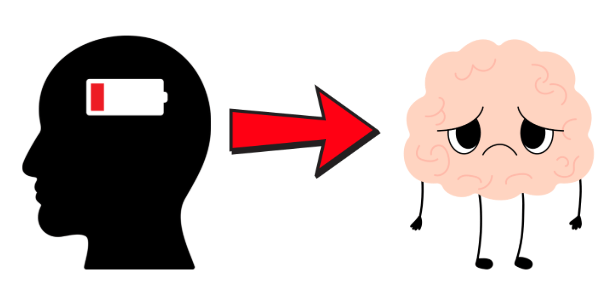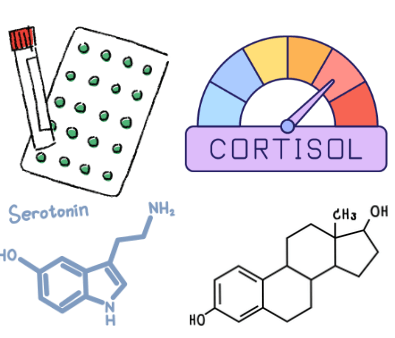The Opposite of Depression isn't Happiness - it is Vitality

Many people think the opposite of depression is happiness. In truth, the opposite is vitality, the physical and mental energy in our cells, in our body, that keeps us healthy.
Sadness is an emotion. Depression is different. It is a physiological state, and at its root lies a shortage of energy.
I am referring to biochemical energy, the energy produced in the cells of the body from the nutrients cells receive.
When someone is depressed, they often feel tired in body and mind. That exhaustion is not laziness or weakness. It is the body’s signal that energy systems are under strain.
Why Depression Develops
Life challenges come in different forms and intensities. Stress is part of being human. We all feel sad, disappointed, hopeless, or even experience grief at times, some of us more than others. But with prolonged, and overwhelming stress (which can come in different, hidden forms - see below), the body changes.
Stress hormones like cortisol rise. Even hormones often thought of as “good,” such as estrogen or serotonin, can act like stress hormones when they flood the system. This explains why depression sometimes appears as a side effect of estrogen-based birth control pills and hormone replacement therapy, or serotonin-boosting drugs (which paradoxically are used to treat depression).
The challenge with long-term stress is this: it suppresses the ability of our cells, including brain cells, to produce energy.
When the brain runs low on energy, mental health declines. Thoughts slow. Mood darkens. Motivation fades.

A Clinical Clue
Early in my practice, I worked with a patient who sought help because his antidepressant was making him more tired. It had also led to weight gain and loss of libido. He didn’t feel better — he felt worse.
Through a natural approach that focused on lowering stress and restoring energy, he began to improve.
In many patients, I’ve seen similar changes when introducing stress-reducing medicinal plants such as Rhodiola rosea. By reducing the body’s stress response, such natural substances often help raise both physical energy and mental clarity. Supporting the thyroid, identifying and eliminating toxins or balancing reproductive hormones can also improve energy — and with it, mood.

Why Does This Work?
Because all of these interventions support the same core function:
👉 the production of energy in the cells — especially in brain cells.
When cells make energy efficiently, both body and mind feel better.
Energy Thieves That Fuel Depression
It’s important to identify and address the “energy thieves” that silently drain resilience:
Life stressors — family responsibilities, challenging relationships, financial strain, caregiving, grief, or loss.
Physical stress — over-exercising, lack of sleep, or chronic overwork.
Seasonal stress — winter darkness can trigger seasonal depression by reducing light exposure.
Oxidative stress — chemical damage from poor food choices like processed foods and unhealthy oils.
Toxic stress — from pollutants, microbes, or internal toxins like endotoxin from harmful gut bacteria, or even certain medications.

Often some of these occur at the same time.
All of these examples act as sources of stress, raising stress hormone levels in our bodies.
Maybe we can't always get rid of our life stressors, but it is easier to address the other types of stressors, thereby reducing the overall burden on the system, allowing depression to subside.
Left unchecked, these stressors weaken energy production and worsen depression.
A Different Way Forward — Restoring Energy and Vitality
Depression is often treated as a problem of mood alone. Psychotherapy can be very helpful when dealing with disappointment or loss. But if what allows depression to take hold is low energy, then the solution has to go deeper.
Each person’s situation is unique — for one person it may be chronic stress hormones; for another, nutrient gaps, thyroid changes, or hidden toxins, or yet, other things.
That’s why a personalized approach often makes the biggest difference.
As a naturopathic doctor, my focus is on helping you uncover the underlying causes of depression — and addressing them at their root. In practice, that often means helping you:
Lower the stress load and support resilience.
Balance hormones, including thyroid and reproductive systems.
Replenish nutrients that fuel brain energy.
Identify and reduce hidden “energy thieves.”

You don’t have to figure this out alone.
If you'd like to explore this approach, I offer a complimentary 10–15 minute exploratory call. In this relaxed conversation, we’ll discuss your situation, uncover what may be draining your energy, and see whether my approach could support you.
If we decide to continue, my fees are reasonable and transparent — my goal is to make this care accessible, not a burden.
Sometimes the first step toward feeling better is simply having the right conversation with someone who looks at the whole picture.
You can find out a bit more about the process: www.drkleinhealth.com



